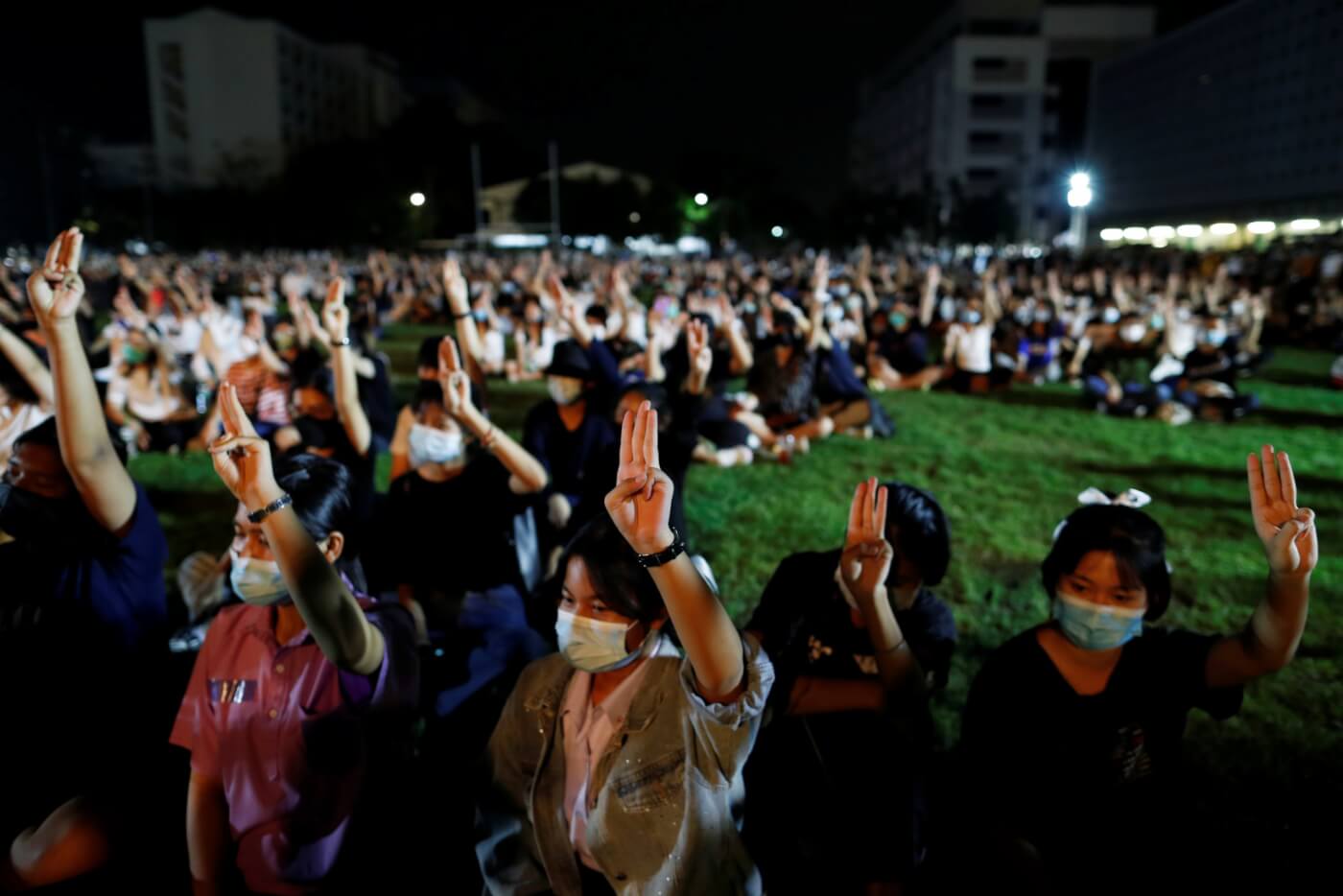Pressure is mounting on the Thai government after weeks of almost daily student-led protests calling for elections and a new constitution. Bangkok saw one of the biggest anti-government protests the capital has seen since the military coup in 2014, despite a coronavirus ban on large gatherings. Arrests and harassment of activists only appear to make the protest movement grow, with more and more sectors of society taking part in the demonstrations against the oppression of freedom of expression and arbitrary detention.
Many have found creative ways to protest including the use of a Japanese anime character and a three-fingered salute from the Hunger Games film, where it is a rousing symbol of defiance against an authoritarian state.
“Thai youths have always used more subversive pop culture forms of discontent,” Dr Aim Sinpeng from the University of Sydney told BBC.
“That’s because of years of living in repressive environments that do not always allow for freedom of expression. [They’re] having to always find creative ways to get around all kinds of censorship.”
What are the protesters calling for?
The protesters are demanding the dissolution of the government headed by Prime Minister Prayuth Chan-ocha, a former army chief, who seized power in a 2014 military coup and returned as the country’s civilian premier after a controversial election in February last year, suppression of freedom of expression and arbitrary detentions. Thousands joined street protests, but these were halted by Covid-19 restrictions.
Things heated up again in June when a prominent pro-democracy activist went missing. Wanchalearm Satsaksit, who had been living in Cambodia in exile since 2014, was reportedly grabbed off the street and bundled off into a vehicle.
Punchada Sirivunnabood, a professor of politics at Mahidol University, says this combination of events has driven the new wave of protest. She told the BBC:
“The students feel like what the government has done is not really democratic. They want a fair government.”
The protests also took an unprecedented turn earlier this month, when they began to include calls to reform the monarchy. Thailand’s monarchy has long been shielded from criticism under strict lese-majeste and other laws. Insulting the monarchy can mean up to 15 years in jail under those laws.
Nine activists arrested
Last week, at least nine pro-democracy activists were arbitrarily detained. Six activists have been arrested on charges of sedition, a crime that can carry a seven-year prison sentence. Two popular rappers were detained as well – Dechatorn Bamroongmuang from the group Rap for Democracy and Thanayut Na Ayutthaya, better known as Elevenfinger, both of whom performed on stage at a July protest at Bangkok’s Democracy Monument. Many student activists are also being served with papers that appeared to indicate they could be imminently detained.
“The Thai government’s repeated promises to listen to dissenting voices have proven meaningless as the crackdown on pro-democracy activists continues unabated,”
said Brad Adams, Asia director at Human Rights Watch, calling for authorities to drop the charges and release all the activists.
Also among the nine was lawyer Anon Nampa, who was charged over a Harry Potter-themed protest in Bangkok at which he called for reform of the monarchy. While emphasising he does not want to overthrow the monarchy but to reform it, Anon questioned King Vajiralongkorn’s decision to take personal command of all military units based in Bangkok, something he believes cannot be compatible with a democratic, constitutional monarchy.
“It had to be done,” he told BBC of his call for accountability.
“That’s why I chose to speak candidly, to honour my own integrity, the integrity of the audience, and out of respect for the monarchy.”
His comments were nothing short of extraordinary in a country where few dare to openly discuss the institution. In recent years, critics of Thailand’s monarchy who have fled to neighbouring countries have been abducted and murdered.
The group Thai Lawyers for Human Rights says it has documented 103 cases where students have been harassed or prevented from expressing their political views, including by making the three-fingered salute, wearing white ribbons or holding pieces of blank paper.
“The government is trying to buy time by arresting activists one by one,” Tattep Ruangprapaikitseree, the secretary general of the protest group Free People Movement, who faces multiple charges, told the Guardian.
“They think that the protest will dissolve, but they are wrong.”

